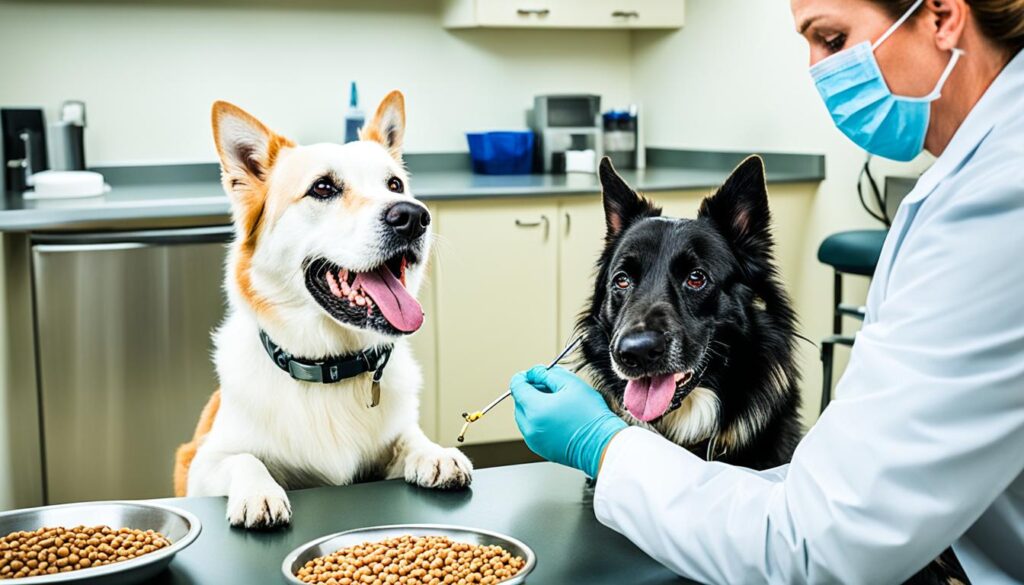Health Benefits of Black Eyed Peas for Canines

Black eyed peas, also known as cowpeas, are not only a delicious addition to human meals, but they can also provide numerous health benefits for our furry friends. So, can dogs eat black eyed peas? The answer is yes! In fact, incorporating black eyed peas into a dog’s diet can offer a range of advantages that promote their overall well-being.
One of the key benefits of black eyed peas for dogs is their high dietary fiber content. Fiber plays an important role in maintaining a healthy digestive system and can help regulate bowel movements. By adding black eyed peas to your dog’s diet, you can support their digestive health and prevent issues like constipation.
In addition to fiber, black eyed peas are a rich source of essential nutrients. They contain protein, which is vital for muscle development and repair, especially in active dogs. These legumes also pack a punch when it comes to vitamins and minerals. They are loaded with vitamins A, C, and K, as well as minerals like potassium and iron, all of which contribute to a dog’s overall health and well-being.
Key Takeaways:
- Black eyed peas are safe for dogs to eat and can offer several health benefits.
- They are a good source of dietary fiber, which promotes digestion and regulates bowel movements in dogs.
- Black eyed peas contain essential nutrients like protein, vitamins, and minerals that contribute to overall canine health.
- They can provide energy and support muscle development in active dogs.
- When feeding black eyed peas to dogs, it’s important to ensure they are cooked thoroughly and free from harmful ingredients like onions or garlic.
Nutritional Value of Black Eyed Peas for Dogs
Black eyed peas are a fantastic addition to a dog’s diet due to their impressive nutritional value. These legumes offer a range of beneficial nutrients that support canine health and well-being.
Low in Fat and Calories: Black eyed peas are low in fat and calories, making them an excellent choice for dogs who need to maintain a healthy weight or lose a few pounds. As an occasional treat or part of a balanced diet, black eyed peas can contribute to overall calorie control.
Plant-Based Protein: Dogs require adequate protein for muscle growth and repair, and black eyed peas are a great source of plant-based protein. Including black eyed peas in your dog’s diet can provide the essential amino acids necessary for optimal canine health.
Vitamins and Minerals: Black eyed peas are packed with essential vitamins and minerals that support various bodily functions in dogs. They are particularly rich in vitamins A, C, and K, which contribute to healthy skin, a strong immune system, and proper blood clotting. Additionally, black eyed peas contain minerals like potassium and iron, which play crucial roles in maintaining healthy blood pressure and promoting oxygen transport in the body.
Fiber Content: The high fiber content in black eyed peas aids in digestion and assists in regulating bowel movements. This can be especially beneficial for dogs with digestive issues or those prone to constipation.
Overall, black eyed peas make a nutritious addition to a dog’s diet, providing essential nutrients like protein, vitamins, minerals, and fiber. Remember, moderation is key, and it’s important to consult with a veterinarian to determine the appropriate portion size and frequency of feeding black eyed peas to your furry friend.
Example Canine Nutritional Value Comparison:
| Nutrient | Black Eyed Peas (Per Cup) | Chicken Breast (Per Cup) |
|---|---|---|
| Protein | 13g | 43g |
| Fat | 0.8g | 3g |
| Calories | 160 | 231 |
| Vitamin A | 600 IU | 0 IU |
| Vitamin C | 11mg | 0mg |
| Potassium | 364mg | 0mg |
Safety of Black Eyed Peas for Dogs
Black eyed peas are generally safe for dogs to consume, but it’s important to take certain precautions to ensure their safety and well-being.
Cooking and Seasoning
When feeding black eyed peas to your dog, it is crucial to cook them thoroughly. Raw or undercooked black eyed peas can be difficult for dogs to digest and may cause gastrointestinal issues. Ensure that the peas are soft and easily mashed before serving them to your furry friend.
Additionally, it’s essential to avoid seasoning black eyed peas with ingredients that can be harmful to dogs. Onions and garlic, for example, contain compounds that can be toxic to dogs and may lead to health problems such as anemia. Stick to plain or lightly seasoned black eyed peas to keep them safe and healthy.
Introducing Black Eyed Peas into the Diet
Introducing black eyed peas gradually into your dog’s diet is recommended. Start with small amounts and observe your dog for any signs of stomach upset or allergies. If your dog experiences any adverse reactions, such as vomiting or diarrhea, discontinue feeding black eyed peas and consult with your veterinarian.
Every dog is unique, and some dogs may have individual sensitivities or allergies. Consulting with a veterinarian before incorporating black eyed peas into your dog’s diet can help ensure their safety and provide personalized guidance based on your dog’s specific needs.
When properly prepared and introduced, black eyed peas can be a healthy and nutritious addition to your dog’s diet. However, it’s always important to prioritize your dog’s safety and well-being by following these guidelines and consulting with a professional before making any dietary changes.
Next, we will explore the conclusion and summarize the key points related to including black eyed peas in a dog’s diet.
Conclusion
When it comes to enhancing your dog’s health, adding black eyed peas to their diet can be a smart choice. These legumes offer a range of nutritional benefits that contribute to your canine companion’s overall well-being.
One of the notable advantages of black eyed peas is their rich fiber content. This dietary fiber aids in digestion and promotes regular bowel movements, keeping your dog’s gastrointestinal system healthy. Additionally, black eyed peas are a great source of plant-based protein, which supports muscle development and repair in active dogs.
Moreover, black eyed peas are packed with vitamins and minerals that are vital for your furry friend’s health. These include vitamins A, C, and K, which contribute to a strong immune system and healthy vision. The presence of minerals like potassium and iron further supports various bodily functions in dogs.
However, it’s crucial to ensure that you cook the black eyed peas thoroughly and avoid adding any harmful ingredients like onions or garlic. The safety and portion size should be discussed with your veterinarian, as they can provide personalized guidance based on your dog’s unique needs and overall health.
Incorporating black eyed peas into your dog’s diet can be a beneficial choice, offering a nutritious boost to their health. Just remember to serve them in moderation, prepare them properly, and consult with your vet for tailored advice. With the right approach, your furry friend can enjoy the health benefits of black eyed peas.
FAQ
Are black eyed peas good for dogs?
Yes, black eyed peas can be beneficial for dogs. They provide dietary fiber, essential nutrients, and energy for active dogs.
What are the benefits of black eyed peas for dogs?
Black eyed peas offer several health benefits for dogs. They aid in digestion, regulate bowel movements, support muscle development, and contribute to overall canine health.
Can dogs eat black eyed peas?
Yes, dogs can eat black eyed peas. However, it is important to cook them thoroughly and avoid seasoning them with ingredients that can be harmful to dogs.
What is the nutritional value of black eyed peas for dogs?
Black eyed peas are a good source of plant-based protein, vitamins A, C, and K, as well as minerals like potassium and iron, which support various bodily functions in dogs.
Can black eyed peas be included in a dog’s diet?
Yes, black eyed peas can be included in a dog’s diet when served in moderation and prepared properly. It is important to consult with a veterinarian to determine the appropriate portion size and frequency of feeding black eyed peas to your dog.
Are black eyed peas safe for dogs?
Black eyed peas are generally safe for dogs to consume. However, it is recommended to introduce them gradually into a dog’s diet to monitor for any potential stomach upset or allergies.
How should black eyed peas be prepared for dogs?
Black eyed peas should be thoroughly cooked and free from any harmful ingredients before serving them to dogs. Avoid seasoning them with onions or garlic, as these can be harmful to dogs.







